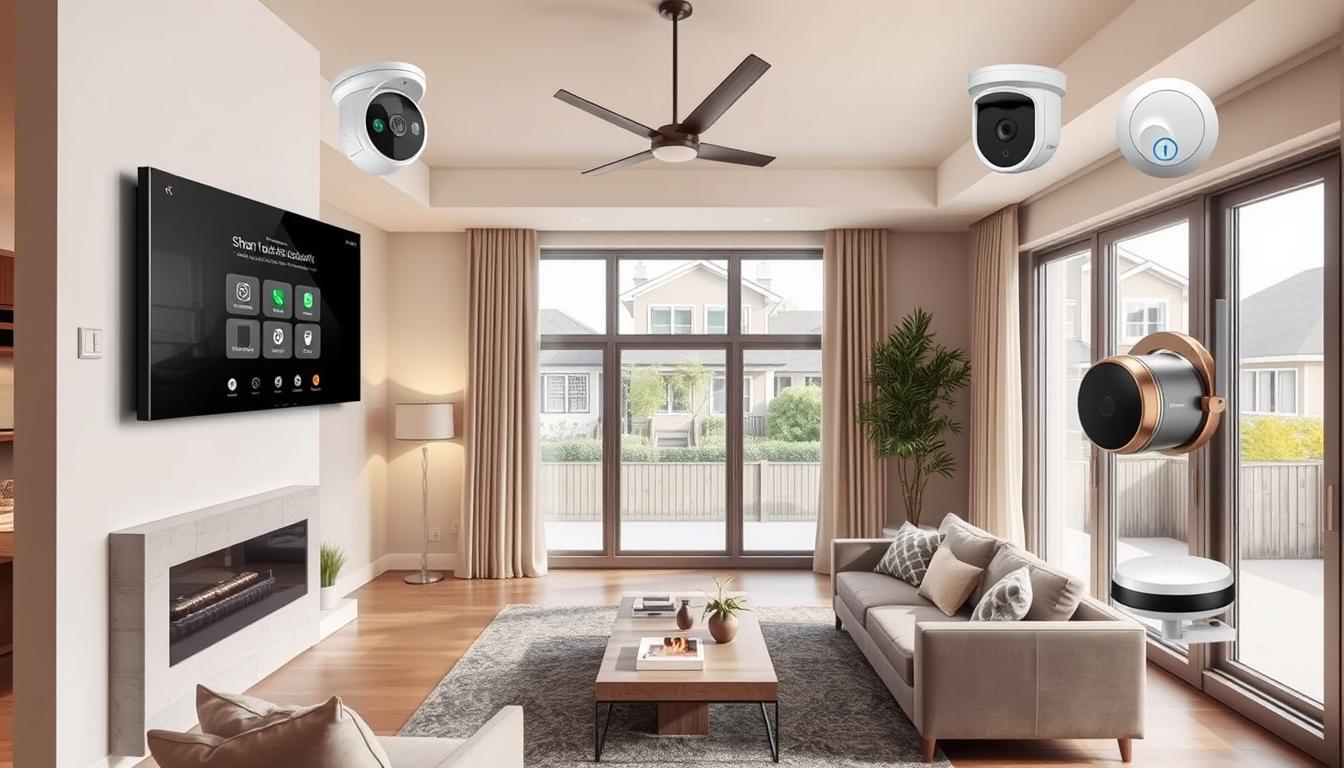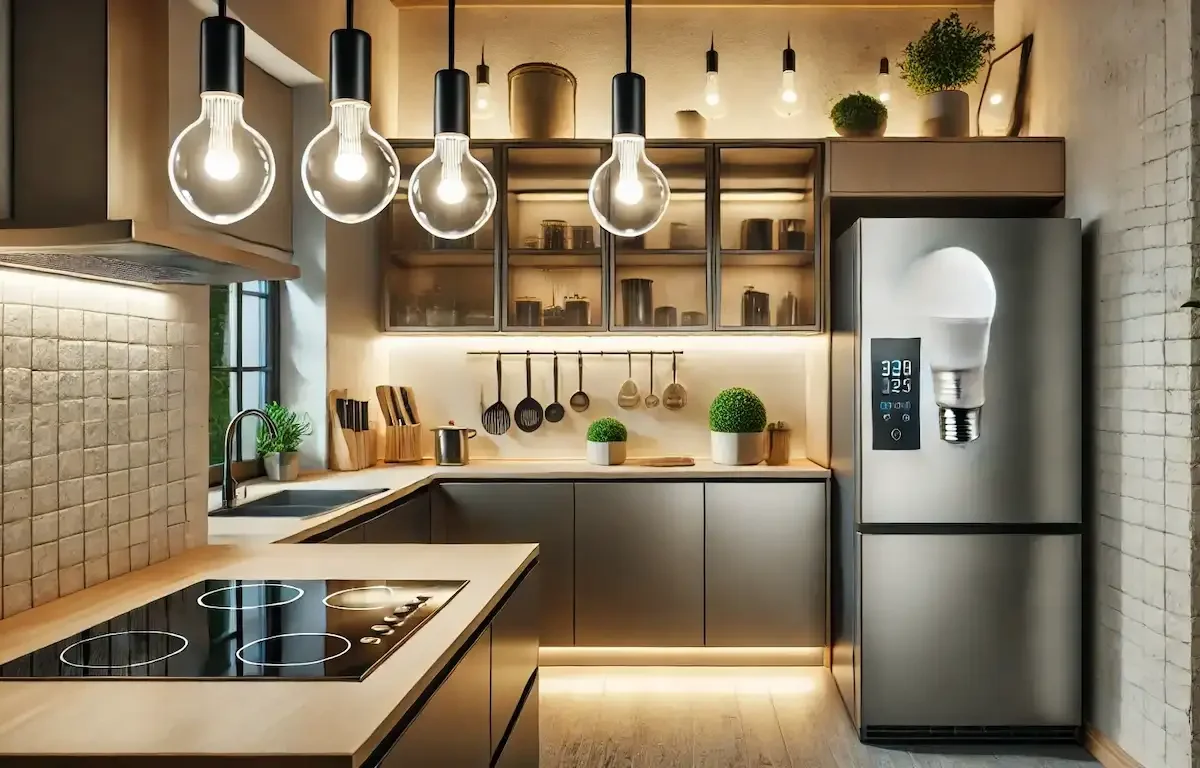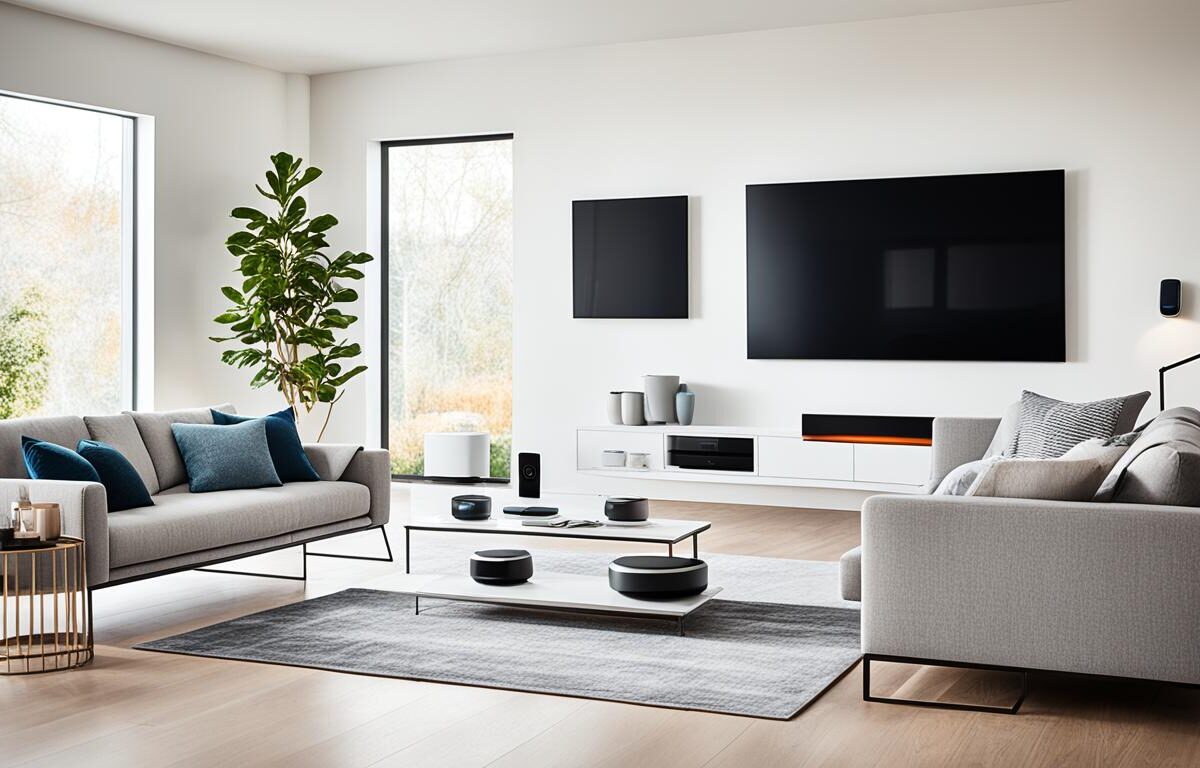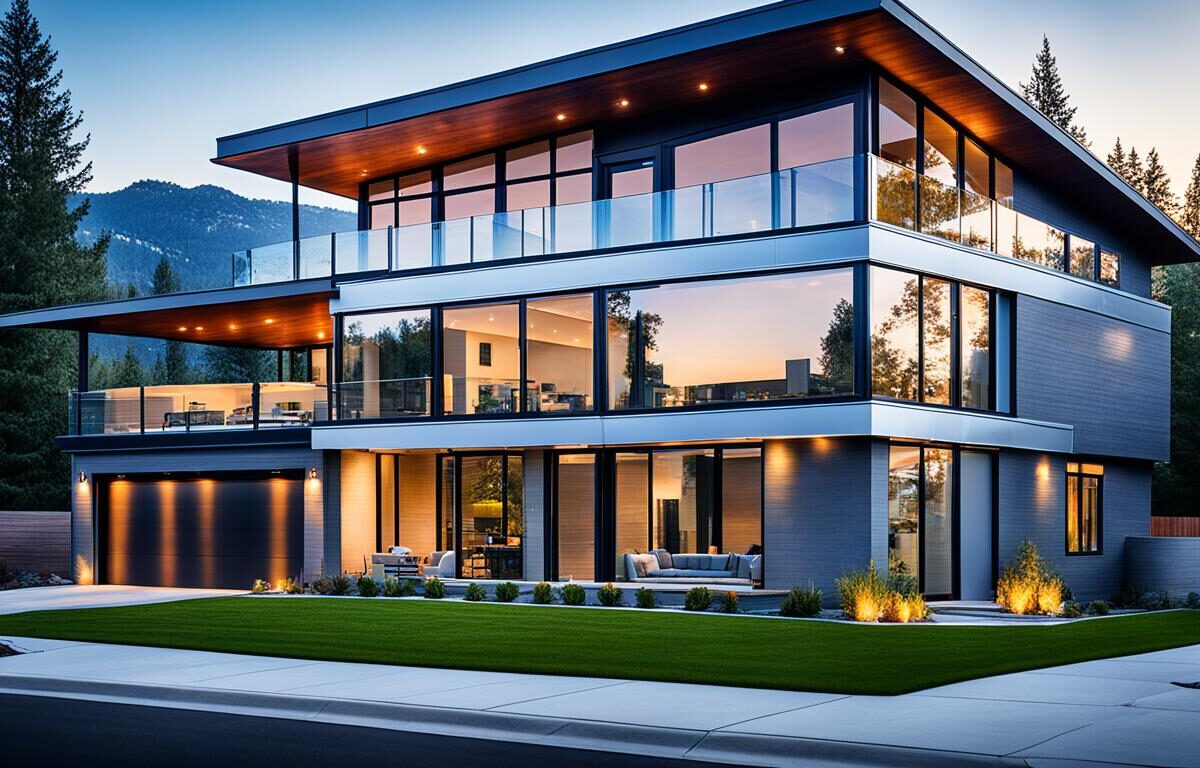Technology has changed how we live, and smart home security systems are leading the way. They make keeping our homes safe easier and more effective. How can smart security devices transform the way you safeguard your property?
Smart home security systems use sensors, cameras, alarms, and connected devices for full protection. They work with the Internet of Things (IoT) to let homeowners check their homes, get alerts, and control security from anywhere. This makes life easier and safer, even when you’re not at home.
Introduction to Smart Home Security
Smart home security uses advanced technology to make homes safer. It connects devices through the Internet of Things (IoT). This creates a complete system for home security and automation.
At the heart of smart home security are features like motion sensors and surveillance cameras. There are also smart locks and alarm systems. These can be controlled remotely through apps or voice commands. This lets homeowners keep their homes safe from anywhere.
- Security cameras in smart home systems offer live streaming, motion detection, and mobile notifications.
- Motion sensors trigger alarms when detecting movement, while entry sensors alert users to opened doors and windows.
- Glass break sensors provide an additional layer of protection against forced entry through windows.
- Sirens are integrated to scare off intruders and alert nearby neighbors in the event of a security breach.
- Keypads allow homeowners to arm and disarm their smart security systems with ease.
Brands like Ring, Nest, and SimpliSafe lead in smart home security. They offer a variety of products for different needs. As technology grows, smart home security will become even more integrated and effective.
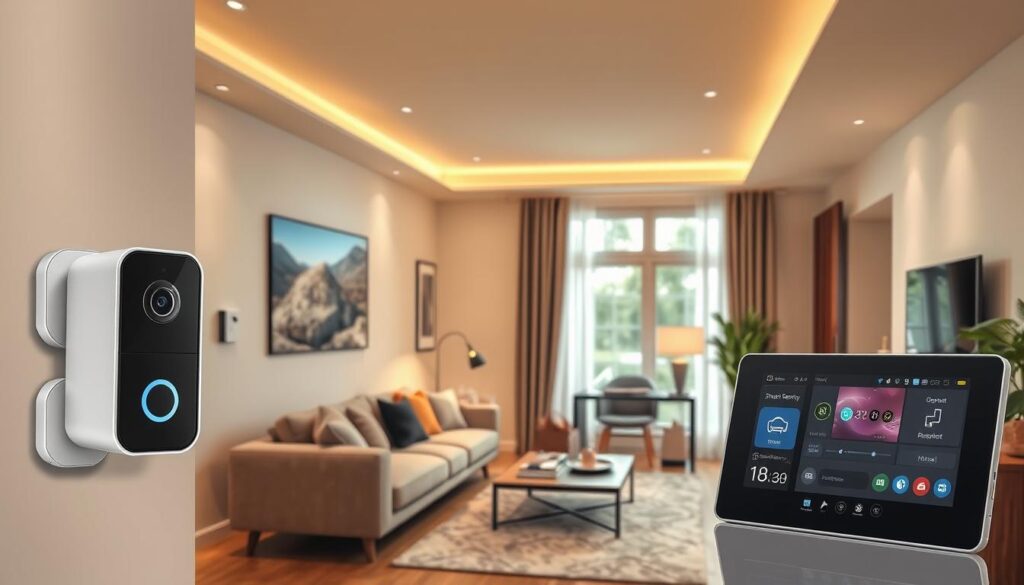
“55% of consumers are concerned about the security of their smart home devices, according to a report from consumer IoT market research firm Parks Associates.”
Smart home security systems have many benefits but also raise privacy and security concerns. Homeowners need to think about cost, installation, and compatibility when choosing a system. It’s important to find the right fit for their home.
Smart Home Security Devices
Smart devices are changing how we keep our homes safe. They include things like motion sensors, door sensors, cameras, smart locks, and video doorbells. These devices have many benefits over old security systems.
Advantages of Smart Home Security Devices
One big plus of smart security devices is you can control them from anywhere. You can watch your home, get alerts, and even turn on your security system remotely. This is all thanks to apps and smart hubs.
These devices also work well with other smart home tech, like lights and thermostats. This means you can automate your home and make it more secure. It’s all about making your life easier and safer.
Many smart devices have cool features like facial recognition and motion detection. These help keep your home safe and give you insights into what’s happening around it.
| Smart Security Device | Upfront Cost | Monthly Fees | Installation |
|---|---|---|---|
| SimpliSafe Home Security | $249.96+ | $20+ | DIY or professional |
| Vivint Smart Home | $599+ | $39.99+ | Professional |
| Abode iota All-In-One | $379.99+ | $8+ | DIY or on-demand professional |
| ADT Command | $599+ | $59.99+ | Professional |
| Ring Alarm Pro | $200+ | Varies | DIY |
Smart home security devices make your life easier and safer. They automate security and offer detailed monitoring. This means you get more control and protection for your home.
Creating a Secure System for Your Home
Setting up a smart home security system needs careful planning. You must place devices like motion sensors, cameras, and smart locks at key spots. This way, you can watch over your home, control who enters, and automate security features.
It’s also crucial to protect your home’s wireless network and devices. Devices like garage door openers and smart sprinklers can be vulnerable. Make sure to change passwords often, use strong security, and update firmware to keep your home safe.
Getting a professional to install and customize your system is a good idea. They can make sure it fits your home perfectly. This includes using encryption, enforcing passwords, and backing up data in the cloud.
| Device Category | Vulnerability Level |
|---|---|
| Outdoor Devices | Most at risk |
| Indoor Devices | Somewhat at risk |
| Smart Home Appliances | Least at risk |
With a well-planned smart home security system, you can keep your family safe. You’ll enjoy peace of mind and the benefits of modern home technology.
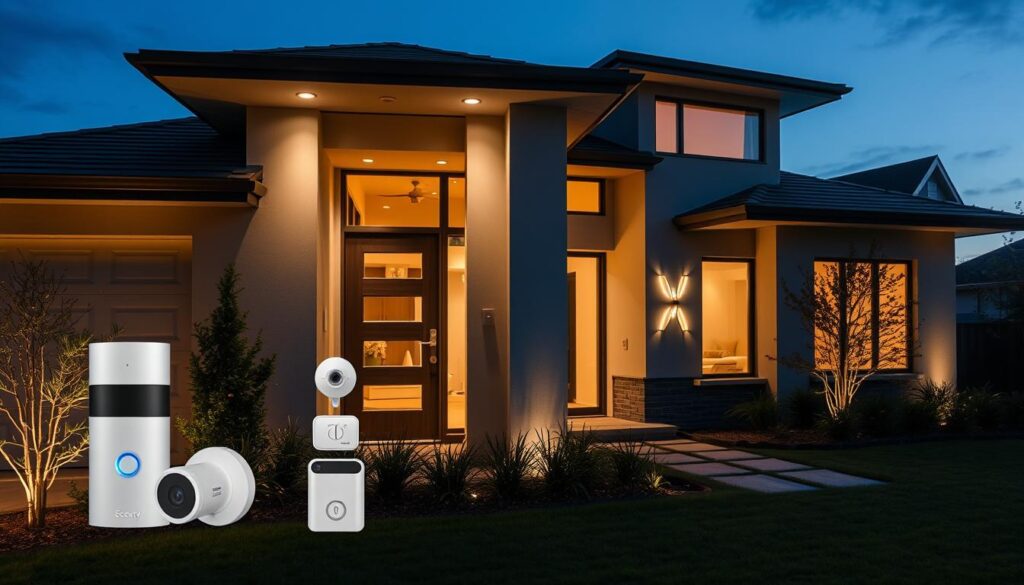
Benefits of Professional Alarm Systems
Professional alarm systems offer many advantages over DIY options. They have 24/7 monitoring by trained staff. This means they can quickly respond to emergencies and call the right authorities.
These systems also include fire and carbon monoxide detection. This gives your home and family a full protection plan.
Why Install a Professional Alarm System
Professional alarm systems offer better protection. Homes without an alarm system are nearly three times more likely to be burglarized. A monitored system deters burglars, making your home less of a target.
These systems also integrate with smart homes. You can control lights, thermostats, and locks from anywhere. This adds to your security and peace of mind.
| Benefit | Description |
|---|---|
| 24/7 Monitoring | Professional monitoring services ensure that your home is under constant surveillance, with trained personnel ready to respond to any alerts. |
| Advanced Security Features | Professional systems often include features like fire and carbon monoxide detection, providing a comprehensive approach to home protection. |
| Reduced Insurance Costs | Installing a home alarm system can lead to a 10-20% reduction in homeowners’ and renters’ insurance costs. |
| Increased Deterrence | The presence of a professional alarm system can discourage burglars from targeting your home, as they are less likely to attempt a break-in. |
| Remote Access and Control | Many professional alarm systems offer the ability to monitor and control your home’s security features remotely, enhancing convenience and peace of mind. |
Investing in a professional alarm system adds a valuable layer of protection. It gives you and your family more security. With its advanced features and monitoring, it’s a key part of a strong home security plan.
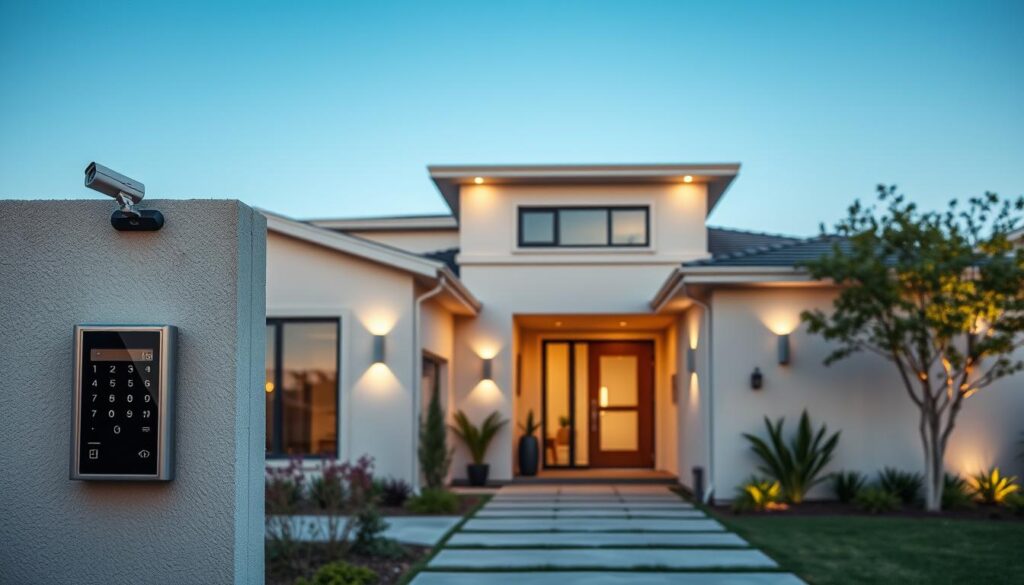
“Installing a home alarm system can reduce homeowners’ and renters’ insurance costs by 10-20%.”
Smart Home Security
Home security has changed a lot, thanks to smart home systems. These systems use the latest tech to keep homes safe and easy to manage. They connect devices like cameras, locks, sensors, and alarms. This lets homeowners check and control their home’s safety from anywhere.
Smart home security sends alerts and lets you see live video on your phone or with voice commands. This gives homeowners peace of mind and control over their home.
Smart home security works well with other smart devices like lights, thermostats, and appliances. This makes home protection more convenient and efficient. Homeowners can create a smart home that makes daily life easier and safer.
These systems also have advanced features like AI analytics. They can spot and alert homeowners to security risks. They even learn your habits to offer better security advice.
The smart home security market keeps growing, giving homeowners more ways to protect their homes. There are many products and services for every budget and need. This makes it easy to create a safe and connected home.
| Smart Home Security Provider | SecureScore™ | Key Features |
|---|---|---|
| ADT | 9.2/10 | 24/7 professional monitoring, cellular backup, SMART Monitoring technology, 150+ years of industry experience |
| Vivint | 9.1/10 | High-tech security offerings, comprehensive home automation capabilities |
| SimpliSafe | 9.2/10 | Stylish wireless equipment, affordable monitoring options |
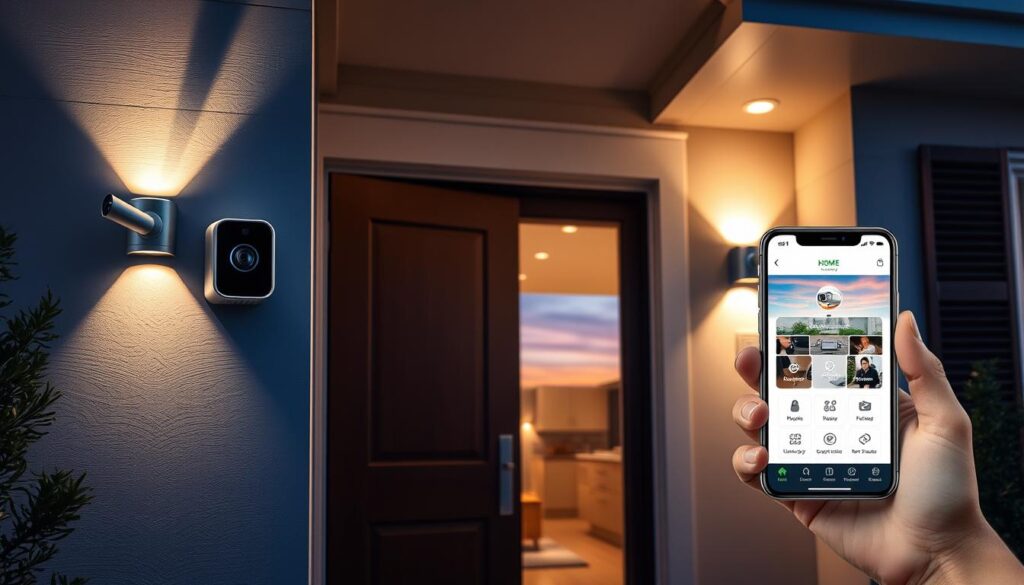
“ADT believes in connecting for protection and offers intelligent Google Nest products in its systems for a smarter, safer home.”
Choosing the Right Smart Home Security Solution
When picking the best smart home security system, it’s key to look at your security needs and home layout. You should think about how well the system works with your current smart home devices. Also, consider the monitoring options and the cost.
First, figure out how many sensors and cameras you need to protect your home. Systems with professional monitoring offer better protection but might cost more each month. DIY options can save money but might need you to watch them yourself.
It’s also important to choose a system that’s easy to install and use. Look for one that fits well with your smart home and has a simple app. This makes it easy to use and keeps you comfortable.
| Feature | Professionally Monitored | DIY Self-Monitored |
|---|---|---|
| Pricing | Higher upfront cost, monthly fees | Lower upfront cost, optional monthly fees |
| Monitoring | 24/7 professional monitoring | Self-monitoring via mobile app |
| Installation | Professional installation | DIY installation |
| Compatibility | May have limited smart home integration | Often compatible with various smart home devices |
When looking at smart home security system options, check out brands like SimpliSafe and Ring. They are known for their good performance and features. By picking a system that fits your security needs and cost considerations, you can keep your home safe and secure.
Don’t forget to think about system compatibility and how easy it is to use. A good smart home security setup should be seamless and reliable.
Seamless Integration with Smart Home Devices
Smart home security systems are great because they work well with other smart devices. This includes smart lights, thermostats, and voice assistants. They use the Internet of Things (IoT) to create a home automation ecosystem.
This integration makes life easier and more secure. Homeowners can control everything from one place. It’s all about convenience, saving energy, and keeping homes safe.
Connecting Smart Home Security with Other Devices
Smart home security integration connects devices like thermostats and lights into one network. This lets homeowners manage their home from a central hub or app. Devices talk to each other through Wi-Fi or Z-Wave.
This setup makes life easier and more efficient. It saves energy by adjusting heating and cooling and turning off lights when not needed. For example, you can lock doors remotely or see who’s at the door.
Motion sensors light up paths and entry points. Smart thermostats save energy by adjusting temperatures. You can also set up custom security settings and routines.
Future updates will make things even better. Homeowners should talk to their security providers to learn more about home security integration.
“The global market for smart home security devices is projected to reach over $135 billion by 2025, as per a 2020 study by Statista, indicating a significant growth trend in the adoption of integrated security solutions leveraging home automation.”
Future of Smart Home Security
Technology keeps getting better, and smart home security is no exception. Artificial intelligence (AI) and machine learning will make security systems smarter. They will detect and respond to threats more effectively.
AI and machine learning will change how security systems work. They will learn from past events and analyze data in real-time. For instance, AI cameras might spot suspicious activity and alert homeowners or the police. Machine learning will also make systems more efficient and save energy.
New tech like biometric authentication, wireless connectivity, and energy-efficient devices will make security systems better. Homeowners will be able to control their security systems easily. This will make managing their homes more convenient.
The future of smart home security looks bright. It will be shaped by smart home security trends, emerging technologies, AI and machine learning, and home security innovations. Homeowners can look forward to more advanced and integrated security systems.
| Statistic | Value |
|---|---|
| Smart home device adoption increase in the past two years | 64% |
| Households owning three or more smart home devices | 23% |
| Americans owning a home security product | 38% |
| Homebuyers prioritizing safety and security when seeking smart homes | 70% |
| SimpliSafe’s subscribing customers | 1 million+ |
| SimpliSafe’s connected devices | Nearly 5 million |
As smart home security evolves, homeowners will see better systems. These systems will use emerging technologies, AI and machine learning, and home security innovations. They will offer top-notch protection and a smooth user experience.
Conclusion
Smart home security systems have changed how we protect our homes. They use advanced tech like sensors and cameras. This makes our homes safer and more convenient than old security methods.
These systems work well with other smart devices. This creates a smooth, automated home system. It makes controlling and securing our homes easier.
Technology keeps getting better, and so will smart home security. This means our homes will be safer with the newest protection tech. Home protection is more important than ever, thanks to smart home systems.
These systems are key to keeping our families safe. As tech advances, our homes will be better protected. We’ll have peace of mind knowing our homes are safe.
Smart home security is now a must-have for modern homes. It offers a safe and flexible way to protect our homes. The smart home industry is growing fast, promising a safer future for our homes.

